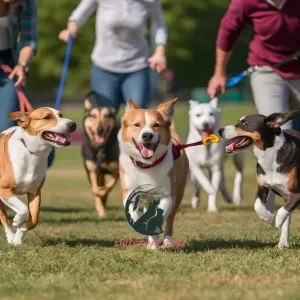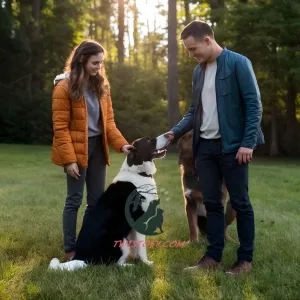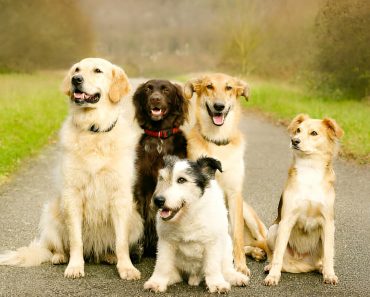
Socialization for Dogs
Welcoming a dog into your family brings joy and companionship, but it also comes with the responsibility of ensuring their well-being and happiness. One of the most crucial aspects of raising a well-adjusted canine companion is socialization. In this comprehensive guide, we’ll explore the importance of socialization for dogs and provide tips on how to help your furry friend thrive in various environments.
Understanding Socialization for Dogs
-
Early Exposure:
-
- Socialization for Dogs begins during the critical developmental period of puppyhood, typically between the ages of 3 to 14 weeks. During this time, puppies are highly impressionable and receptive to new experiences.
- Exposing puppies to a wide range of people, animals, sights, sounds, and environments during this period lays the foundation for confident and well-adjusted adult dogs.
-
Lifelong Process:
-
- While the primary socialization window occurs during puppyhood, socialization is an ongoing process that continues throughout a dog’s life. Dogs benefit from exposure to new experiences and environments at any age.
Benefits of Socialization for Dogs
-
Reduced Anxiety and Fear:
-
- Proper socialization helps dogs develop confidence and resilience, reducing the likelihood of anxiety and fear-based behaviors such as aggression, excessive barking, and destructive chewing.
- Dogs that are well-socialized are more relaxed and adaptable in various situations, making them better companions in everyday life.
-
Improved Behavior:
-
- Socialization for Dogs lays the groundwork for appropriate behavior and manners in different environments. Dogs that are accustomed to interacting with people, animals, and stimuli are less likely to exhibit reactive or problematic behaviors.
- Well-socialized dogs are easier to handle in public settings, such as parks, vet offices, and groomers, making outings more enjoyable for both dogs and their owners.
Socialization Techniques
-
Positive Experiences:
-
- Make socialization a positive and enjoyable experience for your dog by pairing new encounters with treats, praise, and play. Positive reinforcement helps create positive associations and builds confidence.
- Gradually expose your dog to new experiences at their own pace, starting with low-pressure situations and gradually increasing the level of challenge.
-
Structured Socialization for Dogs:

Socialization for Dogs
-
- Enroll your dog in puppy socialization classes or organized group activities where they can interact with other dogs under the supervision of a professional trainer.
- Structured Socialization for Dogs provides controlled environments for dogs to learn appropriate social skills and play behaviors while receiving guidance from experienced trainers.
Socialization Challenges
-
Fear Periods:
-
- Dogs may go through fear periods during their development, where they become more sensitive to new experiences and stimuli. It’s essential to proceed with caution during these periods and avoid overwhelming your dog.
- Respect your dog’s boundaries and comfort levels, and avoid forcing them into situations that cause excessive stress or anxiety.
-
Rescue Dogs and Adult Dogs:
-
- Rescue dogs and adult dogs may have missed out on crucial socialization opportunities during their formative years. While socialization may be more challenging in these cases, it’s still possible with patience, consistency, and positive reinforcement.
- Start slowly and gradually expose rescue dogs and adult dogs to new experiences, focusing on building trust and confidence over time.
Socialization in Practice
-
Variety of Environments:
-
- Expose your dog to a diverse range of environments, including urban areas, suburban neighborhoods, parks, beaches, and indoor settings such as stores and cafes. Each environment offers unique sights, sounds, and smells that contribute to a well-rounded socialization experience.
- Ensure your dog is comfortable and safe in different settings, and be mindful of their individual preferences and sensitivities.
-
Positive Interactions:
-
- Encourage positive interactions with people and animals of all ages, sizes, and breeds. Supervise interactions closely to prevent conflicts or misunderstandings and intervene if necessary.
- Teach your dog appropriate greeting behaviors, such as sitting politely and offering a relaxed posture, to facilitate positive interactions with strangers and other dogs.
Socialization and Behavioral Health
-
Building Trust and Confidence:
-
- Through positive socialization experiences, dogs learn to trust their owners and gain confidence in themselves. This trust and confidence form the foundation for a strong bond between dogs and their human companions.
- Dogs that are well-socialized are more likely to approach new situations with curiosity and enthusiasm, rather than fear or apprehension.
-
Preventing Behavior Problems:
-
- Proper socialization helps prevent behavior problems such as aggression, fearfulness, and anxiety. Dogs that are exposed to a variety of stimuli from a young age are less likely to develop negative associations and reactive behaviors.
- By addressing behavioral issues through socialization, owners can create a harmonious and enjoyable living environment for both themselves and their dogs.
Socialization and Physical Health
-
Stress Reduction:
-
- Socialization has been shown to reduce stress levels in dogs, leading to improved overall physical health. Dogs that are comfortable and relaxed in various environments are less susceptible to stress-related illnesses and behavioral issues.
- Regular socialization outings provide mental stimulation and exercise, contributing to a healthier lifestyle for dogs of all ages.
-
Enhanced Immunity:
-
- Exposure to different environments and stimuli during socialization can help strengthen a dog’s immune system. Dogs that are regularly exposed to new people, animals, and environments develop greater resilience to common illnesses and infections.
- While it’s essential to ensure your dog’s vaccinations are up-to-date, moderate exposure to new environments can help build immunity and promote overall well-being.
Overcoming Socialization Challenges
-
Fear and Anxiety:
-
- Dogs that have had limited socialization experiences or negative encounters may exhibit fear or anxiety in new situations. It’s crucial to approach socialization gradually and patiently, allowing dogs to acclimate at their own pace.
- Counterconditioning techniques, such as desensitization and positive reinforcement, can help dogs overcome fear and anxiety by creating positive associations with previously scary stimuli.
-
Behavioral Rehabilitation:
-
- Rescue dogs and dogs with a history of trauma may require specialized socialization and rehabilitation efforts. While socialization can be more challenging in these cases, it’s not impossible with dedication and patience.
- Working with a professional dog trainer or behaviorist can provide guidance and support in rehabilitating dogs with socialization issues and helping them become confident and well-adjusted pets.
Incorporating Socialization into Daily Life
-
Everyday Opportunities:
-
- Socialization doesn’t have to be limited to structured outings or training classes. Everyday activities such as walks in the neighborhood, trips to pet-friendly stores, and visits to friends’ homes provide valuable socialization opportunities.
- Incorporating socialization into daily life helps dogs generalize their social skills and adaptability to different environments.
-
Quality Time Together:
-
- Socialization outings aren’t just beneficial for dogs; they also strengthen the bond between dogs and their owners. Spending quality time together exploring new places and experiences creates lasting memories and reinforces the human-canine relationship.
- Make socialization outings a regular part of your routine, and enjoy the journey of discovery and adventure with your furry companion.
Conclusion

Socialization for Dogs
Socialization is a vital aspect of responsible dog ownership and contributes to the overall well-being and happiness of our canine companions. By providing positive experiences, exposure to various environments, and opportunities for interaction with people and animals, we can help our dogs develop into confident, well-adjusted members of society. Remember to approach socialization with patience, consistency, and empathy, and always prioritize your dog’s comfort and safety. With dedication and effort, you can help your dog thrive in various environments and enjoy a fulfilling life by your side






